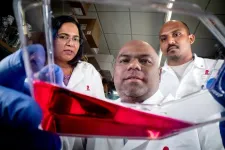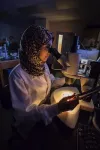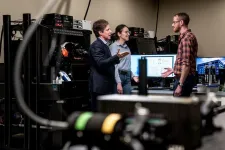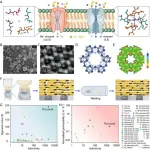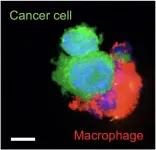The New York Consortium for Space Technology (NYCST) is led by Cornell University, which is funded by the U.S. Department of Defense’s Office of Local Defense Community Cooperation through the Defense Manufacturing Community Support Program.
Ithaca, NY— June 14, 2024 — The New York Consortium for Space Technology Innovation and Development (NYCST) today announced more than $300 thousand has been allocated to support 6 projects through the inaugural round of the consortium’s funding program. The projects were selected during NYCST’s inaugural Space Innovation Symposium. NYCST aims to address the need for advanced defense space technology manufacturing and supply-chain capabilities by fostering collaboration among universities, research institutions, industry experts, and government agencies in New York State. The projects receiving NYCST support today address these needs by supporting activities that include infrastructure improvements, workforce development, and research and development that strengthen and grow the defense space technology industrial base.
“We are forging a new generation of space technology and defense capabilities in New York State and the country” said Professor Mason Peck, Executive Director at NYCST and the Stephen J. Fujikawa ’77 Professor of Astronautical Engineering. He added, “The projects selected today leverage the unique innovative strength of Cornell University’s and New York State’s defense space technology ecosystem that will inform the future of spaceflight and build the next generation of space systems.”
"We are excited to support the New York Consortium for Space Technology (NYCST)'s initiative and look forward to the outcomes of their efforts to bring together diverse stakeholders to enhance space technology infrastructure, strengthen workforce capabilities, drive research and innovation, and support small businesses in the supply chain” said Patrick J. O’Brien, Director of the Office of Local Defense Community Cooperation.
Projects Selected for Funding
Cable-Driven 6 Degree-of-Freedom (DOF) Spacecraft Motion Simulator for Hardware-in-the-Loop (HIL) Testing - University of Minnesota (U of M)
U of M will support installation of a cable-driven robot to be used to simulate the 6 degree-of-freedom (DOF) motion of spacecraft mockup or sensor suite during rendezvous, in order to build a prototype for testing in Ward Hall high bay for NYCST members who need hardware-in-the-loop (HIL) test platform to advance TRL of novel spacecraft technology (e.g., vision systems, GNC algorithms, etc.) (Infrastructure Improvement)
Situational Awareness Satellite System – Paterson Aerospace Systems, Corp. Paterson Aerospace Systems, Corp. will develop a system to improve Space Domain Awareness (SDA) by enabling autonomous, in-situ and real-time threat detection and Collision Avoidance (CA) decision support for spacecraft. (Research & Development)
In-Space Shaping of Deployable Space Structures – Cornell Space Structures (CSS) Laboratory
CSS will develop and in-space assembly and manufacturing (ISAM) solution amenable to the responsive creation of large space structures by designing a deployable building block whose shape can be programmed through buckling during deployment, drastically reducing processing energy and thus build times. (Research & Development)
Space Systems Cybersecurity Standard Testing – Space Infrastructure Lab (SIL)
SIL will establish a hardware-in-the-loop testing environment and develop a set of standardized cybersecurity tests to enable the verification of space mission cybersecurity requirements proposed by the Institute of Electrical and Electronics Engineers Standards Association (IEEE SA) P3449 Working Group. (Infrastructure Improvement)
Space Technology Accelerator – Voyager Space Exploration Systems
Voyager will deliver a pilot program aimed at enhancing R&D, manufacturing and workforce capabilities by working with a cohort of companies to achieve strategic and technical solutions while creating detailed educational case studies and a comprehensive roadmap to guide consortium members in navigating the space technology innovation landscape. The pilot aims to set the stage for a scalable model that promotes broad technological advancements and leadership in the defense space industry. (Workforce Development/Research & Development)
Space Exploration & Career Discovery for K-12 – Science Buddies
Science Buddies will develop hands-on explorations and career discovery activities to support the STEM talent pipeline needed to grow the space industry workforce. (Workforce Development)
About the NYCST Symposium
NYCST’s inaugural Space Innovation Symposium was held today, June 14, 2024, on the Cornell University campus for professionals at the intersection of space technology, innovation and defense. The symposium served as a pivotal bridge, connecting the Department of Defense’s space endeavors with New York’s rapidly growing role in the space ecosystem. Attendees participated in a series of engaging keynote speeches, comprehensive panel discussions, workshops and networking activities.
More information on NYCST
The NYCST, led by Cornell University, is an agile, mission-driven collaboration that unifies resources and expertise in an agile, centrally located environment, to establish an influential hub in the defense space technology industrial ecosystem. The NYCST is a nexus for space-related infrastructure, expertise, capabilities, and financial resources aimed at catalyzing transformative growth in the defense space technology industrial ecosystem. NYCST is a consortium-based organization with partners from industry, academia, and government. Organizations active within the space technology domain or those operating in sectors adjacent to space are welcome to join for no cost. More information can be found at https://nyspacetech.com/membership/.
###
For more information, press only:
Syl Kacapyr
vpk6@cornell.edu
For more information on NYCST:
https://nyspacetech.com/
END
